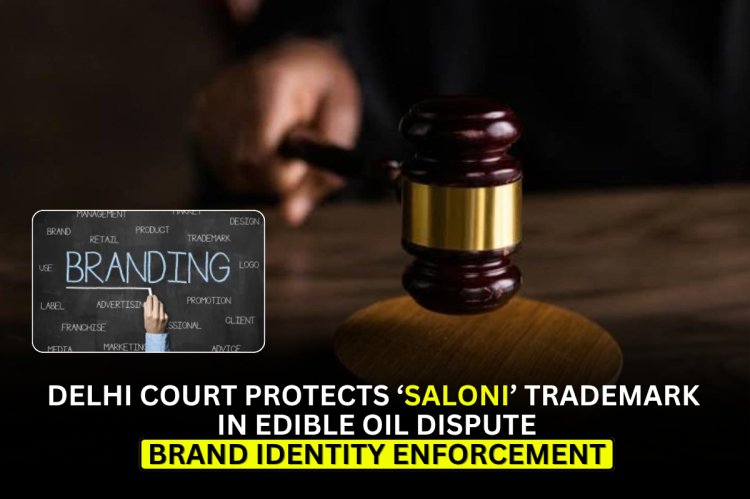Delhi Court Protects ‘SALONI’ Trademark in Edible Oil Dispute | Brand Identity Enforcement
In Mahesh Edible Oil v. HD Oil Mill (2025), the Delhi Commercial Court restrained the use of ‘SALONI GOLD’ for edible oils, citing trademark infringement, passing off, and copyright violation. The judgment reinforces the protection of brand identity and offers legal remedies against deceptive similarity.

Introduction
The significance of protecting brand identity against unauthorised imitation is central to modern intellectual property law. In the case of Mahesh Edible Oil Industries Ltd. v. HD Oil Mill, the plaintiff alleged misuse of its well-known mark “SALONI” by the defendant through the use of the label “SALONI GOLD.” The matter raised key issues around similarity in branding, consumer confusion, and protection of registered trademarks. The Delhi Commercial Court recognised the plaintiff’s statutory rights and penalised the defendant for attempting to profit from the goodwill of a long-established brand.
Background of the Case
Mahesh Edible Oil Industries Ltd. is a registered company engaged in the manufacture and sale of edible oils. Since 1990, the company has been using the trademark ‘SALONI’ in relation to goods and business and has gained worldwide goodwill and reputation. The mark is registered across several classes, and it consists of a device of a woman carrying a pot in red and yellow. The company also has registered copyright in its distinctive packaging.
The plaintiff discovered that HD Oil Mill, a business based in Uttar Pradesh, was selling and marketing edible oil products under the name ‘SALONI GOLD’ using a similar trade dress. The plaintiff alleged that the defendant’s product name, label design and trade dress were deliberately chosen to mislead consumers and capitalise on the plaintiff’s established reputation. The cause of action was stated to have arisen, when the plaintiff had come across the impugned goods of the defendant under the trademark "SALONI GOLD" in the market of New Delhi and again when plaintiff noticed that defendant was not only making the retail sales but was also supplying the impugned goods to various dealers/shopkeepers/retails in New Delhi.
The plaintiff filed a commercial suit before the Delhi Commercial Court seeking a permanent injunction, damages and delivery of infringing goods. The defendant contested the claim, denying any intention to deceive and challenging the plaintiff’s legal standing and the Court’s jurisdiction. The matter thus highlights the questions of deceptive similarity, prior use, and the legal consequences of infringing a registered trademark and copyrighted packaging.
Legal Provisions
The suit highlights the provisions of the Trade Marks Act, 1999, particularly Section 29, Infringement of registered trademarks, Sections 134 and 135 for infringement suit and relief for infringement, and Section 103, False Trade Description under the Act.
The suit also invoked provisions of the Copyright Act, 1957, for the plaintiff brand’s artistic labels and packaging under artistic and original work.
To know more about this you can follow the link below:
Submissions by the Plaintiff
The plaintiff submitted that the mark ‘SALONI’ was a long-established and registered trademark with distinctive trade dress. The defendant’s product, ‘SALONI GOLD’, created confusion in the market, affecting the plaintiff’s brand reputation. This resulted in misleading consumers while attempting to exploit their goodwill. Moreover, the artistic label of ‘SALONI’ was protected under copyright law, and the defendant’s packaging amounted to artistic infringement. Thus, a significant number of sales and the brand presence of the plaintiff have been affected by the defendant, both online and offline.
Arguments by the Defendant
The defendant contended that ‘SALONI’ was a common name and was used by him in reference to his niece's nickname, and did not intend to copy the plaintiff’s brand. Further, the full mark ‘HD SALONI GOLD’ included distinguishing elements like ‘HD’ and ‘GOLD’. Thus, the plaintiff could not claim a monopoly over the commonly used term ‘SALONI’. Moreover, the plaintiff lacked proper authorisation to file the suit, as its representative did not submit a board resolution. The defendant also claimed that the court lacked territorial jurisdiction since the defendant did not have physical presence or operations in Delhi.
Court’s Analysis and Judgment
The Court found that the plaintiff had established his legal rights over the mark ‘SALONI’ through registration in various classes and consistent commercial use. The Court stated that the defendant failed to provide any credible evidence for adopting a similar mark. The Court noted that both parties were carrying on their businesses within the jurisdiction of the court, both offline and online; furthermore, the plaintiff’s registered office is situated within the jurisdiction of the court. Hence, the court was stated to have territorial jurisdiction to try and decide the present case. The Court found that the defendant’s label, packaging, and trade name were similar to the plaintiff’s mark, creating a likelihood of consumer deception. Thus, the adoption of ‘HD SALONI GOLD’ was considered dishonest and aimed at affecting the plaintiff’s sales and reputation.
Relief Granted
The Court, in view of all the findings, granted a permanent injunction restraining the defendant from using ‘SALONI GOLD’ or any deceptively similar mark. The Court also directed the defendant to deliver all infringing materials and packaging to the plaintiff. The Court awarded the plaintiff damages of Rs 5,00,000 (five lakhs) from the defendant with the future interest of 8% from the date of filing of the suit and litigation costs.
Conclusion
The judgment upholds the integrity of registered trademarks, protecting them from unfair competition. The case serves as a precedent for the enforcement of rights while discouraging the deceptive similarity in trademark and visual branding.
Author: Bhavpreet Singh Soni
Co-author: Shabadpreet Kaur












